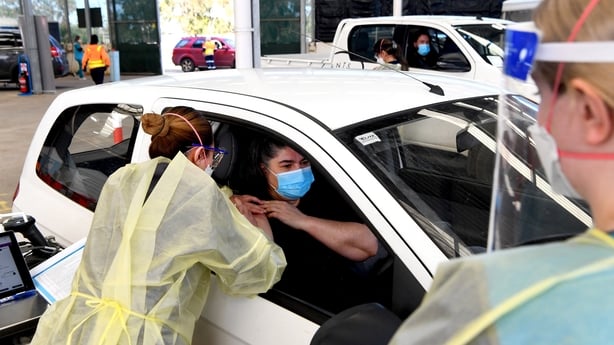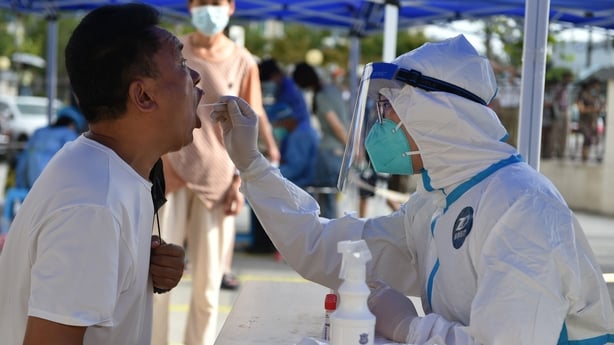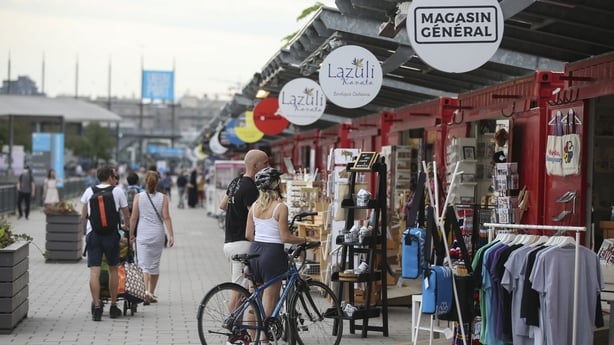The Australian Olympic Committee (AOC) has labelled the government of South Australia "cruel and uncaring" for imposing an extra two-week quarantine for athletes returning via Sydney from the Tokyo Games, meaning a 28 days of quarantine in total.
The additional quarantine requirement for athletes currently isolating in Sydney, the capital of New South Wales, comes on top of the two weeks mandated for all arrivals from overseas.
"Due to the high risk of the Delta strain of Covid-19 in NSW, anyone travelling from New South Wales must undertake 14 days quarantine upon entry into South Australia," the state said in a statement.
The AOC said South Australia had turned down its request for an exemption from the extra quarantine period.
"While other countries are celebrating the return of their athletes, we are subjecting ours to the most cruel and uncaring treatment," AOC Chief Executive Matt Carroll said in a statement.
"They are being punished for proudly representing their country with distinction at the Olympic Games."
The AOC said 56 members of the Australian Olympic team were returning to South Australia 16 were already undergoing quarantine in Sydney.
"Not only are our Olympians fully vaccinated, but they have also been living in a highly controlled bubble in Tokyo, taking the utmost precautions - tested daily over many weeks," said Mr Carroll.
"We have received no explanation as to why our application on behalf of these athletes has been rejected."
The Australian Institute of Sports' Chief Medical Officer David Hughes said the extra quarantine period could not be scientifically justified and posed a significant risk to the physical and mental wellbeing of individuals affected.
Meanwhile, five million people in Australia's second-largest city will remain under stay-at-home orders for at least another week after authorities extended a lockdown after failing to curb Melbourne's latest Covid-19 outbreak.
The city entered its sixth pandemic lockdown last Thursday after a fresh Delta variant cluster emerged at a Melbourne school and quickly spread.
Daniel Andrews, the premier of the state of Victoria, said lockdown rules will be extended until at least 19 August, after 20 new cases were detected overnight including several "mystery" cases.
"There are too many cases, the origins of which are not clear to us... for us to safely come out of lockdown now," he said.
In Sydney, more than five million people are enduring their seventh week under stay-at-home orders, currently scheduled to remain until the end of August.
The state of New South Wales recorded 344 new cases today, taking the total for an outbreak that began in Sydney in mid-June to more than 6,100 cases.

Hundreds of thousands of people outside Sydney - including in Newcastle, Byron Bay and most recently, Dubbo - are in lockdown after cases emerged in recent days.
Authorities are pinning their hopes on a fresh vaccination drive, suggesting some restrictions could be eased if enough people get vaccinated in the coming weeks.
"If we keep the vaccination rate up, we will get to six million jabs by the end of August, which will give us an opportunity to think about what additional freedoms we can give people in September and October," state premier Gladys Berejiklian said.
Australia won global praise for its successful coronavirus response in the early stages of the pandemic, but in recent months has struggled to contain the highly transmissible Delta variant amid a glacial vaccination rollout.
The nation has recorded more than 37,000 cases of Covid-19 and 941 related deaths to date in a population of 25 million.
Hawaii to reimpose Covid-19 restrictions as Delta variant surges
Hawaii will re-impose Covid-19 restrictions limiting social gatherings to avert straining the state's healthcare, Governor David Ige has said. It comes as the rapid spread of the Delta variant pushed cases and hospitalisations in the United States to a six-month high.
"I'll be signing an executive order that will limit social gatherings, effective immediately," Mr Ige said in a tweet.
In June, social gatherings were increased to 25 indoors and 75 outdoors state-wide but now it will be capped to no more than ten indoors and 25 outdoors.
Hawaii, with more than 60% of population fully vaccinated, has witnessed a rise in cases by 168% between 26 July and 8 August, according to the state's department of health.
The latest guidelines will reduce the indoor capacity for bars, gyms, restaurants, and social establishments to 50%, Mr Ige added.
Covid-19 restrictions have also been extended until 1 October in Ukraine, in a move to tackle a surge in infections from the rapidly spreading Delta variant.
The country's prime minister, Denys Shmygal, said: "Unfortunately, experts are beginning to register the first negative trends in terms of hospitalisation of those seriously ill, therefore the government is adopting a decree to extend the state of emergency and adaptive lockdown until 1 October."
The "adaptive lockdown" means regional authorities have the power to tighten or ease restrictions depending on the situation locally. The state of emergency had been due to expire at the end of August.
Ukraine, with a population of 41 million, has been among the most affected European countries, with around 2.3 million Covid-19 cases and 53,149 deaths as of 11 August, while only 2.5 million have been fully vaccinated so far.
Meanwhile, China is keeping its guard up as its latest surge of Covid-19 cases entered its fourth week, with calls from officials to close containment loopholes unlikely to see cities easing strict virus control measures.

China reported 83 new locally transmitted cases for 10 August, the health authority reported, bringing the cumulative number of new infections in the past week to 583.
That was an increase of 85.1% in the total number of local cases from a week earlier. The rate is almost unchanged from the 87.5% surge seen the previous week, which officials say has been mainly driven by the Delta variant.
The Delta variant has been detected in more than a dozen cities since the first cases were found in Nanjing in late July, spurring officials in Beijing to tell local governments to overcome "a laxity of mind" in their containment measures and close loopholes in their virus-fighting efforts.
But China has refrained from full lockdowns of major cities such as those seen during the early days of the pandemic in the Hubei province, to avoid paralysing the economy, though some economic pain has been felt.
Residential compounds or districts deemed at greater risk have been sealed off. Cities with areas marked as medium-or-high-risk have seen varying degrees of restrictions at public venues.
Quebec to roll out Canada's first vaccine passport
Canadians wanting to eat at a restaurant, go to a bar or gym, or attend a festival in Quebec will have to present a vaccine passport starting 1 September.
The province will be the first in Canada to require such passes, which are increasingly being used across the world to limit entry to public places to those who have been vaccinated, recovered from Covid-19 or tested negative.
They are also hugely controversial in some jurisdictions leading to mass protests against mandatory inoculations.
"Our objective with the passport is not to go backwards to a lockdown and, at the same time, to avoid overloading our hospitals," Quebec Health Minister Christian Dube told a news conference.
Health officials have warned that Covid-19 infections are once again on the rise after plunging in June and July, despite more than 60 percent of the Canadian population being fully vaccinated.

The Quebec government is to clarify in the coming weeks which public places will be obliged to require the vaccine passports, which will be in paper or electronic format.
New York was the first US city to announce last week the introduction of vaccine passes for access to public places.
Quebec, the second most populous province in Canada after Ontario, recorded 234 new Covid-19 cases yesterday.
Some 84% of Quebecers have received a first dose of vaccine and 70% are fully vaccinated.
Mr Dube warned that a fourth wave of Covid-19 infections led by the Delta variant in the autumnl was "inevitable."
To date, the Delta variant is responsible for a third of Covid-19 cases in Quebec but the minister expects it to increase to 50% "in the coming weeks."

